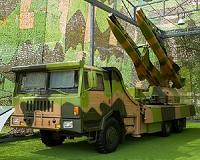| . |  |
. |
Beijing (UPI) Jan 12, 2009 China has successfully tested new technology capable of intercepting missiles in midflight, state media reported. The move comes amid increased tensions over Taiwan and repeated complaints by Beijing over the planned sale of American weapons to its hostile neighbor. The official Xinhua News Agency reported that "ground-based midcourse missile interception technology" was tested in Chinese territory. "The test has achieved the expected objective," the terse, three-sentence report said. "The test is defensive in nature and is not targeted at any country," it added. The decision to publicize the test follows several days of criticism of the U.S. arms sales, including a $3 billion deal for the 330 PAC-3 Patriot missiles. Bent on becoming a regional superpower, Taiwan has recently embarked on a major modernization program, purchasing state-of-the-art weapons to advance its military capabilities. Patriot missiles are designed to detect, target and knock down incoming missiles. The system is modular and highly mobile. A single unit, for example, can be deployed within an hour. Military experts believe China can deploy missile systems along the country's coastline, facing Taiwan. China considers Taiwan a breakaway province, repeatedly warning that it could use its military might if the island moved to seek formal independence. Most recently, a senior Chinese general called for "countermeasures" against the United States, including an end to military contacts, in response to the planned arms sale to Taiwan. In Washington, however, the Defense Department opted to disassociate China's missile test with the contested arms sales. "We did not receive prior notifications of the launch," said Maj. Maureen Schumann, a Pentagon spokeswoman. "We detected two geographically separated missile launch vents with an ex-atmospheric collision also being observed by space-based sensors," she added. "We are requesting information from China regarding the purpose for conducting this interception as well as China's intentions and plans to pursue future types of intercepts." Military analysts say missile technology has been one focus of the Chinese military's modernization scheme, which has increased the country's arms spending by almost 15 percent last year to $69 billion. Yang Chengjun, a senior Chinese military strategist for missile studies, told China's state-run Global Times newspaper that the latest test ushered China into a "new phase" in terms of missile interception technologies. "Compared with a previous test of anti-satellite technologies, the missile interception system is more advanced as the targets are moving objects and the satellite was flying within a preplanned orbit," Yang was quoted as saying. China eased off military-to-military contacts with the United States after the previous administration in Washington notified Congress in October 2008 of its plan to sell an estimated $6.4 billion arms package to Taiwan.
Share This Article With Planet Earth
Related Links Learn about missile defense at SpaceWar.com Learn about nuclear weapons doctrine and defense at SpaceWar.com All about missiles at SpaceWar.com Learn about the Superpowers of the 21st Century at SpaceWar.com
 China shows off air defences with anti-missile test
China shows off air defences with anti-missile testBeijing (AFP) Jan 13, 2010 China said Tuesday it had successfully tested a missile intercept system in what analysts described as a show of its advanced air defence capabilities amid tensions over US arms sales to Taiwan. "China conducted a test of ground-based mid-range missile interception technology within its territory, which achieved its objective," foreign ministry spokeswoman Jiang Yu told reporters. "This test is defensive in nature and not targeted at any other country and is consistent with the national defence policy of China," Jiang said. ... read more |
|
| The content herein, unless otherwise known to be public domain, are Copyright 1995-2009 - SpaceDaily. AFP and UPI Wire Stories are copyright Agence France-Presse and United Press International. ESA Portal Reports are copyright European Space Agency. All NASA sourced material is public domain. Additional copyrights may apply in whole or part to other bona fide parties. Advertising does not imply endorsement,agreement or approval of any opinions, statements or information provided by SpaceDaily on any Web page published or hosted by SpaceDaily. Privacy Statement |